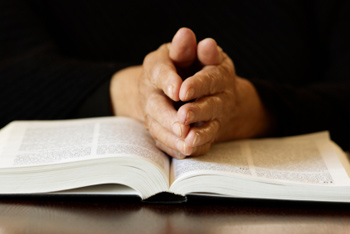Nearly every night, the Rev. Jim Wallis tucks his sons, Luke and Jack, into bed. It is a routine so important to him that he arranges his considerable appearance schedule around it. There, amid scattered storybooks, toys, tangled sheets and homework, Wallis engages in one of the most important acts of his day -- perhaps of his entire spiritual life. He listens to his sons’ prayers.
Wallis, the founder of Sojourners, a Christian magazine and related ministries dedicated to social justice, says making a habit of hearing his children’s bedtime prayers is chief among his spiritual practices “because it distills the essence of Christ’s love back to me. Their prayers and my conversations with them -- well, they are just formative for me.”
Wallis is not alone in his dedication to spiritual practices -- daily acts of Scripture reading, devotion, Christian meditation and, of course, prayer. Christian leaders from a variety of backgrounds revitalize their relationships with God by employing these ancient techniques of tapping into the Holy Spirit. Through such daily engagement, these men and women say they come away not only with their hearts, minds and souls refreshed in God, but also with a renewed strength and passion for living the gospel in their roles as leaders, mentors and examples to others.
“You can’t just preach it,” Wallis said. “You have to have a set of personal spiritual disciplines that deepen your personal faith.”
Come to me with your minds as well as your hearts
For many years, spiritual practices were rarely engaged in many mainline Protestant traditions. Reformed Christianity, for example, emphasized an intellectual approach to God. Even many evangelicals have frowned on spiritual practices as “works,” counter to the belief that salvation comes by grace alone.
But today centuries-old Christian exercises are growing more popular among mainline Protestants. Some credit the change to charismatic renewal that spread through the Catholic community in the 1960s and was adopted by some Episcopalians. Richard Foster’s “Celebration of Discipline” was very influential in popularizing contemplative prayer. Others point to Trappist monks Thomas Keating, Basil Pennington, Thomas Merton and William Meninger, who advocated Christian centering prayer and meditation.
Regardless of the exact spark, mainline Protestants soon began to reach back to the spiritual practices of the pre-Reformation church in search of a more personal and intimate experience of God. They turned for inspiration to church mothers and fathers, many of them mystics like John of the Cross and Teresa of Avila, who engaged in contemplative and counted prayer, Christian meditation and spiritual communion with the Holy Spirit.
The Rev. Tony Campolo, a professor emeritus of sociology at Eastern University who has written about spiritual practices, was inspired by the emotional connection to the Holy Spirit he witnessed in the Pentecostal community. But as a Baptist, he found the Pentecostal expression ultimately unsatisfactory. So he turned to the mystical writings and life of St. Ignatius of Loyola, and practices such as the prayer of examen.
Campolo sees the mainline Protestant community moving away from the head-based faith of Calvin and toward the more heart-based faith of John Wesley. “As we move into the postmodern era, I think it is the era for the triumph of Wesley and his sense of subjective surrender to the indwelling of the Spirit and the ecstasies that can bring,” Campolo said.
Phyllis Tickle, who promotes the keeping of the fixed-hour prayers of the church in her book series “The Divine Hours,” also points away from the Reformers’ strictly intellectual approach. “The theology is patent in Christianity itself. The Lord says come to me with your minds as well as your hearts, and what I think is happening is a correction back from thinking too much from the head.”
Indeed, the foundation for such practices is present throughout the Bible. It is foremost in what Jesus called the first and greatest commandment: “Love the Lord your God with all your heart and with all your soul and with all your mind.” Advocates of spiritual practices say that ignoring this commandment results in an incomplete experience of God, which should be one of the whole person, heart, soul and mind.
The writings of the Apostle Paul are the theological cornerstone of such practices. His letters are full of references to letting the Holy Spirit in, to allowing the Spirit of God to move within one’s life -- the ultimate goal.
“Now we have received not the spirit of the world, but the Spirit that is from God, so that we may understand the gifts bestowed on us by God,” Paul writes to the Corinthians (1 Corinthians 2:12-14). And we speak of these things in words not taught by human wisdom but taught by the Spirit, interpreting spiritual things to those who are spiritual.
“Those who are unspiritual do not receive the gifts of God’s Spirit, for they are foolishness to them, and they are unable to understand them because they are discerned spiritually.”
‘We speak not of ourselves, but of Christ’
“Paul says ‘think on these things,’ and that is what I do,” said Campolo, who is the founder of the Evangelical Association for the Promotion of Education, an organization that develops schools and social programs.
His spiritual practices begin with centering prayer in the morning and end with the prayer of examen at night. The 73-year-old Campolo credits this discipline with allowing him to keep a schedule that includes 400 speaking appearances a year.
“I feel a distinct rush that results in an aliveness and enthusiasm and a burst of spiritual energy,” Campolo said. “When Jesus spoke, he spoke as one having authority. That was a spiritual quality of his being, and Christian leaders, if they are going to speak with authority, they have to access spiritual practices that will infuse them with an authority beyond themselves. We speak not of ourselves, but of Christ, and that depends on the extent to which we allow Christ to be in us at one time.”
In addition to strengthening an individual’s spiritual life, Christian spiritual practices have the potential to build up the community and identity of the church.
Elisabeth Koenig, a professor of ascetical theology at the General Theological Seminary of the Episcopal Church, emphasizes the literal meaning of the word “practice” -- the repeated performance of a task or action regularly over time.
“Practices help us to develop an explicit, strong sense of personal identity we can return to when the going gets rough,” said Koenig, who teaches courses in Christian spiritual practices.
When performed by a group -- a congregation, members of a ministry or other body -- they also can establish a communal identity. Koenig likens this to the way a sports team functions.
“Both spiritual practices and sports involve the development of higher and higher degrees of complex action and interaction. And when people cooperate together in ways that are more intricate and complex, they also grow a new, stronger sense of communal identity,” she said.
Slowing down, opening up
Like Campolo, Wallis knows the rejuvenation -- both physical and spiritual -- that comes from daily spiritual discipline. Ironically, this energy comes from the fact that the practices slow him down.
“The problem with most leaders is our schedule,” Wallis said. “For me, it is incoming fire all day long. Even my taxicab rides are scheduled with interviews. Nothing ever stops, but something has to slow you down, and for me that is prayer.
“Prayer is not talking, it is listening. So when I pray, it just refreshes and relaxes and calms me and I start breathing again and I empty my mind and begin to focus on the deeper things. And things come to me -- some of my best ideas.”
Wallis’s complaint about the rapid-fire pace of his life is common for many Americans.
“If we are not deliberate about ordering how we live, in time we are just going to be washed away,” said Dorothy Bass, who studies Christian spiritual practices as head of the Valparaiso Project on the Education and Formation of People in Faith at Valparaiso University.
“There is a 24-7, 365 culture out there, and it is becoming even spiritually difficult to just sit still. But there are ways of shaping our lifetimes that acknowledge that we do not have all the time in the world, and that time can be used and opened in ways that we can be more present to God and to one another,” she said.
Bass and colleague Craig Dykstra explained their ideas about Christian spiritual practices in their 1997 book, “Practicing Our Faith: A Way of Life for a Searching People.”
Bass takes a broad view of what makes a Christian spiritual practice and emphasizes that almost anything we do in the course of a day can become one if approached with intention and openness to the spirit. In this way, the preparation of family meal, the welcoming of a guest, the keeping of the Sabbath can all become Christian spiritual practices. Even the taking of bath can become a Christian practice if one approaches it with the idea that caring for the body is caring for God’s creation.
Humility and authenticity
Richard Land knows the value of staking out a time for his spiritual practice. As president of the Southern Baptist Convention’s Ethics and Religious Liberty Commission, he is constantly on the road, bouncing between his offices in Nashville and Washington, D.C., as he represents the SBC’s social and moral concerns to lawmakers.
To Land, maintaining a sense of awe is critical for leaders because without it they risk becoming too complacent in their relationship with God and, ultimately, in their work.
“I think it is essential to maintaining authenticity,” Land said. “I believe that it is critical that we understand that we are dealing with an infinite, holy word from a sacred source…. We must always understand that we are never going to be fully able to grasp or scale the heights of God’s revelations to us. But we will understand more in humility than without it.”
Humility is critical for spiritual practices, even more so for those who lead others. Without it, there is a risk of becoming too sure, too certain that the fruits of the practices -- clearer communication with God -- make one right and unchallengeable.
“The silence is deafening when you go too far, when the racket in your head sounds remarkably like you,” Tickle said. “If you think you are getting to be a real spiritual warrior you better watch out because you are all of a sudden going to be standing there alone because the Spirit is going to have left you.”
Questions to consider
Questions to consider:
- What are the potential dangers of engaging in intentional practices of spiritual discipline? What are the dangers of not doing so?
- How can we engage in individual spiritual practices, such as the examen, without forgetting the communal context of the church?
- How do we grow in spiritual maturity and in humility at the same time?
- Mother Teresa was once asked what she says to God in prayer and responded: “Nothing. I listen.” What does God say? “Nothing, he listens.” Then she concluded, “And if you can’t understand that, I can’t explain it to you.” What could she have meant?





















